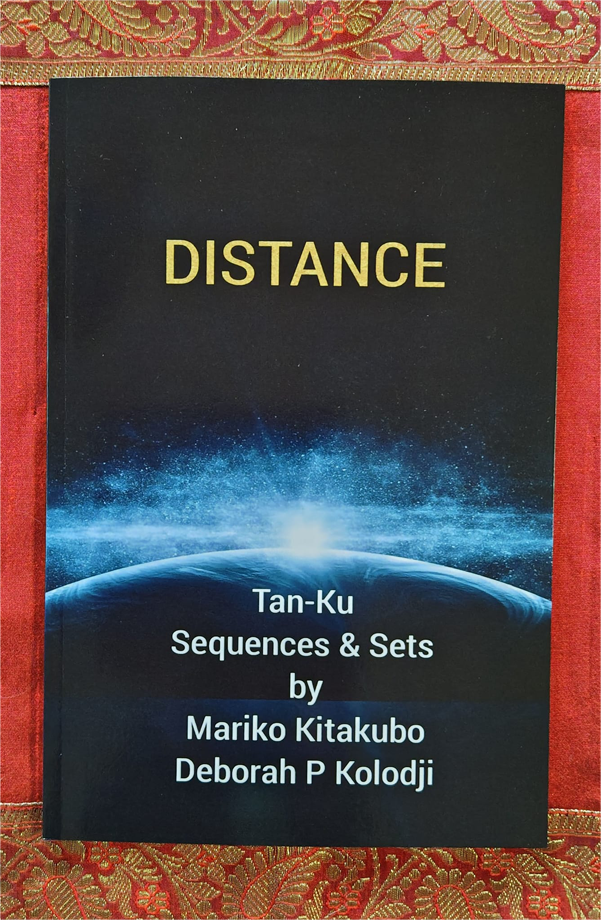Contemprary Tanka Poet Mariko Kitakubo. Article details.
Mr. William Scott Galasso posted a book review on DISTANCE
Mr. William Scott Galasso wrote an excellent review on the California State Poetry Society website for the book "DISTANCE." My sincere gratitude to Mr. William Scott Galasso.

WILLIAM SCOTT GALASSO REVIEWS DISTANCE by MARIKO KITAKUBO & DEBORAH P KOLODJI
Distance. Tan-ku Sequences and Sets by Mariko Kitakubo and Deborah P. Kolodji, Shabda Press, Duarte, CA www.shabdapress.com. 2023, 93 pp.$18.00 U.S (softcover), print 2023932505, ISBN:978-1-7377113-6-0
Deborah P. Kolodji is the longtime Moderator of the Southern California Haiku Study Group, a member of the board of directors for Haiku North America, and the inaugural recipient of The Science Fiction & Fantasy Poetry Association’s Presidents’ Lifetime Service Award. In addition, her highway of sleeping towns haiku poetry collection was awarded a Touchstone Distinguished Book Award from The Haiku Foundation. Mariko Kitakubo of Tokyo, is renowned for seven tanka collections, three of which are bilingual Cicada Forest, On This Same Star, and 2016’s Indigo. Needless to say, given their combined literary pedigree, their collaborative work Distance sets a high bar concerning one’s expectations.
Fortunately, Distance, subtitled Tan-Ku Sequences and Sets (for tanka and haiku), not only meets but exceeds these lofty expectations. These longtime friends, one might suggest (twin daughters of different mothers) have esteemed one another’s work for years. Each sharing their work and experiencing travels back and forth from the U.S and Japan between 2007-2019.
Then the pandemic struck and most conversation frequently expressed in verse (haiku by Deborah and tanka by Mariko), became their modus operandi. The first of seven sections, we hold virtual hands illustrates how these gifted poets formulated their dialogue. One would text, the other would respond and bridging the time and distance between them literally and figuratively. They did more than cope with different time zones, they excelled in creating unexpected connections.
The still waters of their call and response formula regardless of the specific subject matter inform each other and grow with each reading. Each of the seven sections is distinct in focus, yet they achieve synchronicity when considered as a whole. Here are some samples of their sets and sequences. I’ve chosen shorter pieces (primarily the sets) as examples due to limitations of space. However, the reward of reading the sequences contained this work is equal in terms of consistent quality.
This piece is from the initial section, we hold virtual hands:
Connecting Souls
there is
an invisible thread
between us…
quietness of
the pearl oyster
closing my eyes
I see your face
Vermeer’s earring
And this from the second section the eternal wind focused on Deborah’s battling illness:
Cancer
wind will bring
the summer storm
my garden
bordered by living
cadmium yellow
wild mustard
growing out of control
clinical trail
And section three presents us with a classical Japanese reference:
Forest Bathing
uphill path
I slow down to breathe
the pine scent
she perches
at the edge of
my straw hat
a butterfly’s siesta
in emerald breeze
Each section gives us a deep sense nature’s healing power and inherent beauty, a part of Gaia’s treasured gift to us, her children. Hence, reminding us of our own responsibility as stewards of the earth. Here are two more samples that conjure two very different strands of the emotional spectrum the first derives from traces of us, the second from the section entitled my words drift.
End of the Tunnel
no one knows…
I escaped from
his violence
silent night
holy night
no more scarves
to hide the bruises
New Year’s resolution
In contrast with the celebratory…
9th Inning
losing streak
the crack of his bat
hits a foul ball
every motion
stops and restarts
slowly…
we catch our breath
Gyakuten Sayonara!
The final line means “coming from behind,” a “goodbye,” a homer with the bases loaded that give a team the lead.
Finally, I would be remiss not to include a sequence, from as the road bends:
First Blanket
behind
pale cloud face
the dignity
before perfection
chestnut moon
waiting, waiting
the slow rise
of the sun
previously…
what do you
remember?
smiles for the sky
newborn baby
first blanket
your face peeking out
from its folds
This collection Distance is full of quiet beauty and a wide range of subject matter comes Highly Recommended.
- William Scott Galasso

 Prev
Prev